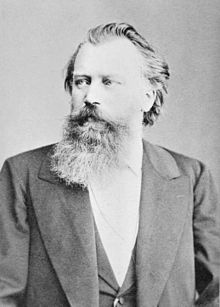Nänie (the German form of Latin naenia, meaning "a funeral song"[1] named after the Roman goddess Nenia) is a composition for SATB chorus and orchestra, Op. 82 by Johannes Brahms, which sets to music the poem "Nänie" by Friedrich Schiller. Brahms composed the piece in 1881, in memory of his deceased friend Anselm Feuerbach. It was first performed by the Tonhalle Gesellschaft Chorus Zürich on 6 December 1881, conducted by Brahms.[2] Nänie is a lamentation on the inevitability of death; the first sentence, "Auch das Schöne muß sterben", translates to "Even beauty must die". Typical duration of a performance is approximately 15 minutes.
| Nänie | |
|---|---|
| Choral composition by Johannes Brahms | |
 The composer in 1887 | |
| Opus | 82 |
| Text | "Nänie" by Friedrich Schiller |
| Language | German |
| Composed | 1881 |
| Dedication | To Henriette Feuerbach, in memory of Anselm Feuerbach |
| Performed | 6 December 1881, Zürich |
| Movements | 1 |
| Scoring | SATB chorus and orchestra |
Poem
editSchiller's lament is not for a specific person but the death of the abstract "beautiful" ("Das Schöne"). Schiller mentions three episodes from Greek mythology, but again mostly without names, assuming that the reader with knowledge will make the connections. The first episode refers to Orpheus who tries to rescue Eurydice from the underworld, the second refers to Aphrodite's mourning of her lover Adonis, the third refers to the failed effort of Thetis to save her son Achilles from death.
Auch das Schöne muß sterben! Das Menschen und Götter bezwinget, |
Even beauty must die! That which subjugates gods and men |
Setting by Brahms
editBrahms began his composition in spring 1880 as a response to the death of his friend, the painter Anselm Feuerbach. He chose the text referring to the frequent motifs from Greek mythology in the painter's work. Brahms completed the composition in the summer of 1881 and dedicated it to Henriette Feuerbach, the painter's stepmother.[3] Written about a decade after Ein deutsches Requiem, it shows a similar approach of consolation of those who mourn a death.
Other compositions
editHermann Goetz also set the text to music in 1874 as Nenie, Op. 10.[4]
References
edit- ^ "nenia", Charlton T. Lewis, Charles Short, A Latin Dictionary
- ^ "Nänie" work details, Carus-Verlag, Autumn 2020, p. 4
- ^ Kalbeck, Max (2013). Johannes Brahms. Eine Biographie in vier Bänden (in German). Severus Verlag. ISBN 978-3-86-347654-0.
- ^ Nenie, Op. 10 (Goetz): Scores at the International Music Score Library Project
External links
edit- Nänie, Op. 82: Scores at the International Music Score Library Project
- "Auch das Schöne muß sterben!", text and various translations, lieder.net
- Nänie, free scores at the Brahms Institut[dead link]
- Nänie on YouTube, University of Memphis Chamber Orchestra and University Singers, April 2011